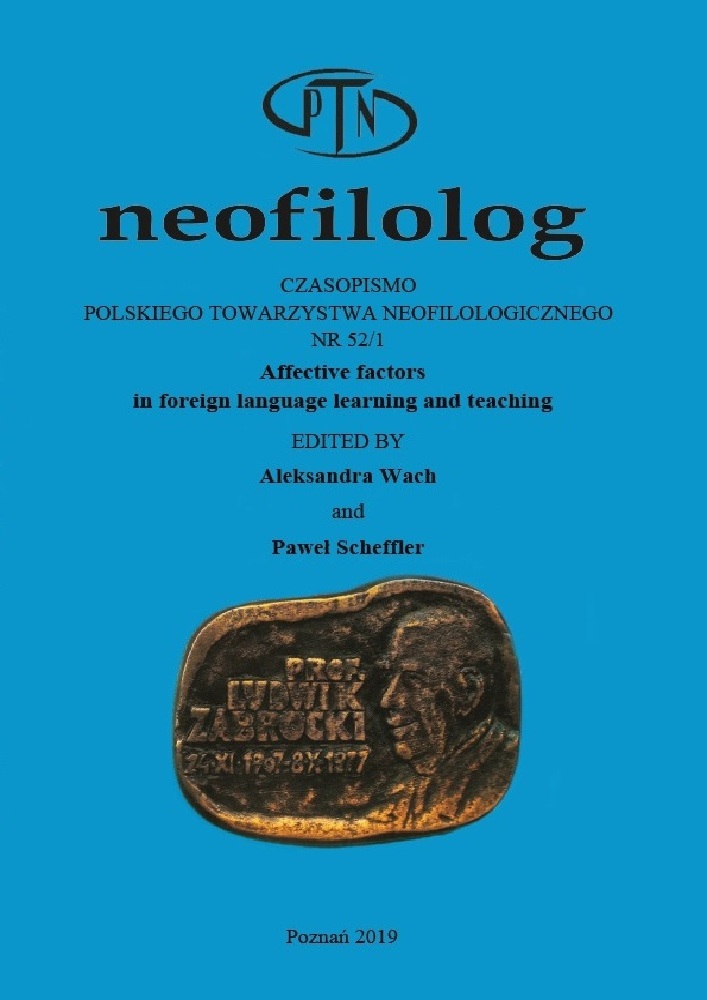Abstract
This article explores the concept of teacher professionalism, focusing primarily on factors motivating teachers to pursue professional development within the framework of formal, organized teacher development programmes offered by educational institutions. Its major purpose is to contribute to a better understanding of motivational issues involved in teacher education, or teacher learning, as it is sometimes referred to. Its other purpose is to liven up a discussion concerning language teacher education as a life-long experience. The article consists of two parts: its theoretical sections focus on the notions of professionalism and a professional, together with the concepts of autonomy and reflection/reflective practice, which are crucial from the point of view of teacher development. Next, factors motivating teachers to continue their development both as professionals and as individuals are addressed. The second part present and discusses results of a small-scale individual research project which yielded some interesting data pertaining to motivational issues involved in teacher learning.
References
Bailey K.M., Curtis A., Nunan D. (2001), Pursuing professional development. Boston, Mass.: Heinle & Heinle.
Breen M.P., Mann S.J. (1997), Shooting arrows at the sun: perspectives on a pedagogy for autonomy (in) Benson, P., Voller, P. (eds.), Autonomy and Independence in Language Learning. London/New York: Longman, pp. 132-149.
Edwards C. (1996), Learning to learn how to teach: developing expertise through experience (in) Willis, J., Willis, D. (eds.), Challenge and change in language teaching. Oxford: Heinemann, pp. 99-107.
Finocchiaro M. (1988), Teacher development: a continuing process (in) “English Teaching Forum”, No 26, pp. 2-5.
Harmer J. (1998), How to teach English. Harlow, Essex: Longman.
Hirschhorn S. (2011), Initial teacher training 1 (in) “English Teaching Professional”, July, Issue 75, pp. 50-52.
Hirschhorn S. (2011), Initial teacher training 2 (in) “English Teaching Professional”, September, Issue 76, pp. 48-51.
McGrath I. (2000), Teacher autonomy (in) Sinclair B., McGrath I., Lamb T. (eds.), Learner autonomy, teacher autonomy: Future directions. Harlow: Longman, pp. 100-110.
Lange D.L. (1990), A blueprint for a teacher development program (in) Richards J.C., Nunan D. (eds.), Second Language Teacher Education. Cambridge: Cambridge University Press, pp. 245-268.
Little D. (1995), Learning as dialogue: the dependence of learner autonomy on teacher autonomy (in) “System”, No 23, pp. 175-182.
Richards C.J., Farrell, T.S.C. (2005), Professional development for language teachers. Strategies for teacher learning. Cambridge: Cambridge University Press.
Richards J.C., Nunan D. (eds.) (1990), Second language teacher education. Cambridge: Cambridge University Press.
Smith R. (2000), Starting with ourselves: teacher-learner autonomy in language learning (in) Sinclair B., McGrath I. and Lamb T. (eds.), Learner autonomy, teacher autonomy: Future directions. Harlow: Longman, pp. 89-99.
Tort-Maloney D. (1997), Teacher autonomy: a Vygotskian theoretical framework. CLCS Occasional Paper no. 4. Trinity College, Dublin: Centre for Language and Communication Studies.
Ur P. (1997), The English teacher as professional (in) “English Teaching Professional”, July, Issue 8, pp. 3-5.
Ur P. (1998), Distinctions and dichotomies – teacher training, teacher development (in) “English Teaching Professional”, January, Issue 2. 21.
Williams M., Burden R.L. (1997), Psychology for language teachers. Cambridge: Cambridge University Press.
Willis J., Willis D. (eds.) (1996), Challenge and change in language teaching. Oxford: Heinemann.
Werbińska D. (2011), Developing into an effective teacher of English. Słupsk: Wydawnictwo Naukowe Akademii Pomorskiej w Słupsku.
Zawadzka E. (2004), Nauczyciele języków obcych w dobie przemian. Kraków: Oficyna Wydawnicza „Impuls”.
License
Copyright (c) 2019 Neofilolog

This work is licensed under a Creative Commons Attribution-NoDerivatives 4.0 International License.
Authors
Authors of texts accepted for publication in Neofilolog are required to complete, sign and return to the Editorial team’s office the Agreement for granting a royalty-free license to works with a commitment to grant a CC sub-license.
Under the agreement, the authors of the texts published in Neofilolog grant Adam Mickiewicz University in Poznań a non-exclusive, royalty-free license and authorize the use of Attribution-NoDerivatives 4.0 International (CC BY-ND 4.0) Creative Commons sub-license.
The authors retain the right to the free disposal of the work.
Users
Interested Internet users are entitled to use works that have been published in Neofilolog since 2017, under the following conditions:
▪ attribution – obligation to provide, together with the distributed work, information about the authorship, title, source (link to the original work, DOI) and the license itself.
▪ no derivatives – the work must be preserved in its original form. Without the author's consent, it is not possible to distribute the modified work in the form of translations, publications, etc.
Copyrights are reserved for all texts published since 2017.
Miscellaneous
Adam Mickiewicz University in Poznań retains the property right as a whole (layout, graphic form, title, cover design, logo etc.).

